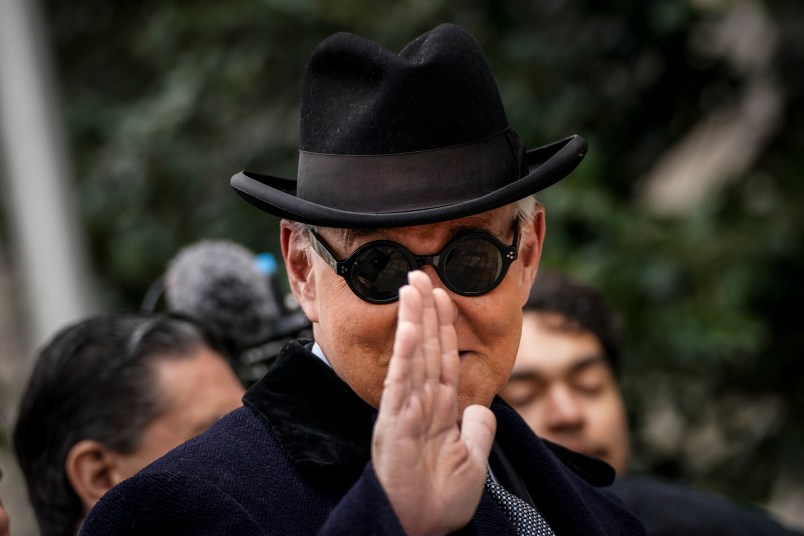Federal prosecutors told the judge in Roger Stone’s case that the “only reason” that they are going along with Stone’s request to delay his surrender date is that doing so is in line with a broad policy from the Justice Department for the COVID-19 pandemic.
A late Thursday night filing from the U.S. Attorney’s Office in D.C., plus a separate filing Friday from the Stone’s attorneys, gives a fuller picture of Stone’s efforts to put off going to prison for his 40-month sentence.
“To conform with our policy and practice—and for no other reason—the U.S. Attorney’s Office for the District of Columbia does not oppose a 60-day extension of the defendant’s self surrender date,” the DOJ filing said.
The prosecutors said that the Bureau of Prisons had made the move to initially delay Stone’s surrender date until June 30 due to the pandemic, while suggesting that they were not at all involved in those discussions.
On Friday, Stone told the judge that when he asked BOP on June 1 to delay the surrender date again, he did not receive a BOP response beyond an automated acknowledgement of the request. Later, on June 10, Stone’s lawyers were informed by “government counsel” that BOP was no longer granting such requests. But further discussions with the “parties” involved resulted in him filing the request with her.
The prosecutors said Thursday they’re not opposing the request because of a directive from the Executive Office of United States Attorneys that due to the pandemic, only in certain circumstance should the DOJ oppose defendants’ requests to delay surrender dates.
Stone’s case does not present those circumstances, the prosecutors said Friday. Specifically, Stone does not pose a flight risk nor is he a danger to the community — a claim the DOJ rested on findings the judge made herself when allowing Stone to voluntarily surrender.
“[T]his Office possesses no actionable information of a change in circumstances to press against that determination, faithful adherence to EOUSA’s directive dictates that we not oppose a 60-day extension,” the DOJ said.
The prosecutors said that how they’re treating Stone’s request is in line with how the executive office’s directive has been applied across the country. There “is no instance in which this Office has opposed a request to extend a self-surrender date during the pandemic,” they said, pointing to three other recent cases where they went along with similar delay requests.
That U.S. District Judge Amy Berman Jackson is making all the parties explain all these behind-the-scenes machinations suggests that she is reluctant to take Justice Department at its word. She ordered the explanations after Stone claimed earlier this week that the Department was not opposed to his delay request.
Jackson sentenced Stone in February to 40 months in prison after a jury convicted him of false statements, witness tampering and obstruction of Congress’ Russia probe.
The department previously watered down its sentencing recommendation for Stone, in a series of moves that the judge called “unprecedented.”
Just before Stone on Tuesday filed his request to delay his surrender date, written congressional testimony from a prosecutor who had worked on his case was made public. In the testimony, the prosecutor, Aaron Zelinsky, alleged that political considerations motivated the department to change the sentencing memo, which prompted him and three other career prosecutors to resign from the case.
It’s unclear if the allegations played a role in the judge then ordering the DOJ to put “in writing” its reasons for its position in the surrender date matter.
Stone’s court filings Tuesday also seemed to contradict what he said in an Instagram over the weekend, in which he claimed that the government rejected his delay request and that is why he was now turning to the court. On Friday, Stone explained that government had informed his lawyers on June 10 that BOP “was no longer extending surrender dates based on COVID-19.”
“BOP would not be changing Stone’s June 30, 2020 surrender date. 10. BOP’s determination led to discussions between the parties that ultimately resulted in Stone’s decision to file his Unopposed Motion to Extend Surrender Date,” Stone said.
Read the filings below:



